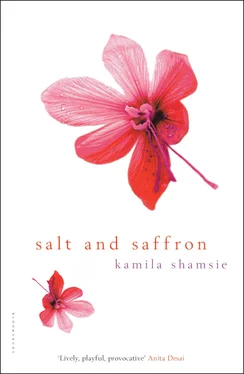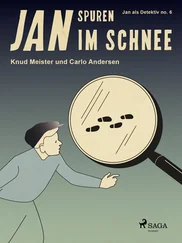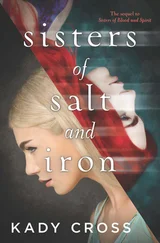‘Really? Remember how everyone thought Mama was delirious in those last days because she kept talking about seeing Taimur in her bedroom?’ Akbar had his head in his hands now, but Sulaiman, spitting blood, pressed on. ‘Please, please, Akbar, do me a favour and go to Pakistan the day it becomes a reality. Go on, leave Dard-e-Dil. Taimur will be back in a flash when he hears you’ve gone.’
Akbar stood up. ‘Well, accept this gesture of brotherly love, then. I’ll leave now and stay away altogether. For ever.’
The next day he flew to Karachi to accept a longstanding offer to join a British company. He never went back to Dard-e-Dil.
I left Dadi’s house before my grandmother emerged from her room. Meher Dadi seemed to understand. ‘You can’t leap from that story into idle chit-chat,’ she said. ‘Go home. Sit out in the garden where the crickets chirp, and listen to the weeping of ghosts. They deserve a little attention now and then.’
I did just that. It was my favourite time of day; trees and houses and electricity poles silhouetted against the sky which was not so much dark as absent of light. The afterglow of sunset, an in-between time. I lay on the grass, kicked off my shoes and held my hands up, fingers apart, to allow the breeze to caress as much of my body as possible. The rustle of leaves was a benediction. Karachi’s nights remind you that you can love a place, and for me that’s always been a reason to rejoice. But that night I thought of Akbar flying into Karachi for the first time. How alien it must have been to him. How lost he must have been in that first moment when he disembarked and thought, My children will call this home. They will know sunsets over the ocean and the taste of crab so fresh it’s barely dead and they will hear blessings in the breeze from the sea. But they will not know Sulaiman and they will not know Taimur. And in not knowing those two, they will not know me.
He was twenty-six.
History betrayed Akbar and Sulaiman. At any other time the elders of the family would have chastised them for their foolishness, told them they weren’t boys any more, forced them to shake hands. But it was 1946 and all sorts of foolishness was in the air.
When the brothers walked back to the dining room, several feet apart, the assembled company took one look at Meher’s tears and Sulaiman’s jaw and a cacophony of questions arose.
Sulaiman spoke first. ‘My brother has just convinced me that Pakistan is a good idea. We can send the dregs of Dard-e-Dil there, and he’ll be the first.’
The atmosphere in that room was already tense, the good cheer brought on by dinner unable to sustain itself through dessert. If Akbar and Sulaiman hadn’t been so intent on their own rage earlier they would have heard the raised voices, and from the sudden hush that followed they would have known that the Nawab, with all the courtesy and regality at his disposal, had requested that there be no more talk of politics. But the peace that prevailed was uneasy, and it took only one sentence from Sulaiman to destroy it. Before the evening was over the terms ‘polite disagreement’ and ‘neutral party’ had disappeared from the Dard-e-Dil lexicon. Akbar aside, all the other Dard-e-Dils present at the palace that evening would continue to coexist within a radius of a few square miles until the following year, when Pakistan came to life, but it was a strange, strained year with few moments of family solidarity.
(The Nawab? Everyone gathered at the dinner called him Binky. How effective could he have been in bringing them to order?)
Perhaps it was inevitable, the falling out. In a family like the Dard-e-Dils — so proud and so stubborn — it’s hard to imagine people shrugging their shoulders and calling the choice between India and Pakistan just a matter of different opinions. And yet, instead of blaming the family characteristics, we blame Akbar and Sulaiman.
When Samia told me not to mention my grandparents to Baji, it was because the general consensus — on both sides of the border, though I wasn’t aware of that until Samia explained it to me — was that ties between the Indian and Pakistani sides of the family would eventually have been renewed if it hadn’t been for Akbar and Sulaiman, each declaring that he did not want to hear his brother’s name again, each constantly reminding the rest of the family of all the harsh words, the insults, the curses that had been hurled across the Nawab’s table. The only one who could have brought the brothers together was Dadi, or so it is claimed, but she never tried. Worse, when Akbar once — while picking candles out of a birthday cake and looking sadly at the pock-marked frosting — wondered what his brother was doing, Dadi accused him of being spineless.
How to reconcile this story with my own memory of Dadi crying, ‘We were girls together.’ I think I know the answer. They weren’t happy together, my grandparents. Ami once told me the reason Aba so seldom raises his voice to anyone is that he grew up in a house filled with shouting. So, if Dadi railed against Akbar for mentioning Sulaiman, maybe it was just because she was looking for an excuse to rail against Akbar.
But is it possible that in twenty-five years there was never a moment when they were simultaneously nostalgic for everything they’d left behind, for every voice they could no longer hear? The truth may be that it was easier to make one swift break and swear never to look back. The truth may be that Dadi loved Akbar too much to allow him to begin to think of everything he’d lost.
But what of everything she had lost?
I stood up and walked over to Mariam Apa’s hibiscus. After Mariam left, the mali asked Ami what should be done about the hibiscus. Ami told him to look after it as Mariam had, and never, never to snip off the branch which curved in front of the dining-room window. I sometimes think Ami was the one who missed Mariam most of all. She wasn’t haunted by her absence, or angered by her departure, or disturbed by all she had failed to see. She just missed her. If Mariam were to come back, Ami would be the only one who’d say, ‘I’m glad you’re here,’ and consider the conversation ended. But suppose Mariam were to come back with Masood? That could never happen, so I don’t even speculate.
Speculate, I demanded of myself. Go on, speculate.
But I couldn’t.
I ran my fingers along the hibiscus plant, scoring the bark with my fingernails. When Mariam was around it hadn’t mattered, but now I felt so terribly the need to have her explained. I had thought Taimur could lead me to her, if I only asked the right questions about him, but he grew more and more elusive. To leave your home and never go back — to commit yourself completely to making another place home — that I could understand. Dadi and Akbar’s story doesn’t baffle me, though it sometimes saddens me. But to leave home, alone, and then to return just once, for one night, that I cannot comprehend. Somehow he must have followed the lives of his family. How else would he have known his mother was sick? How else would Mariam have known that, other than Dadi, who was in Paris at the time, the closest relative she had to turn to was Aba? Her closest relative in Pakistan, that is. Why Pakistan and not India? Was she in Pakistan already? Had Taimur ended up in Pakistan, as Sulaiman claimed Akbar believed he would? Or was Pakistan simply closer than India to wherever Taimur and Mariam lived? Did that mean she came from Iran? Afghanistan?
Turkey?
When Samia first went to college in London she fell in with a strange arty set who spent their Friday nights watching foreign films and ordering out for meals which, in their ethnic origins, complemented the movies. The group fell apart over an argument about whether hamburgers were suitable accompaniments to a German film, but by then Samia had developed a taste for subtitles. She came back to Karachi over her Easter holiday and demanded that Sameer and I scour the video stores for foreign films. She wasn’t amused when we returned with a pile of Hollywood flicks.
Читать дальше












